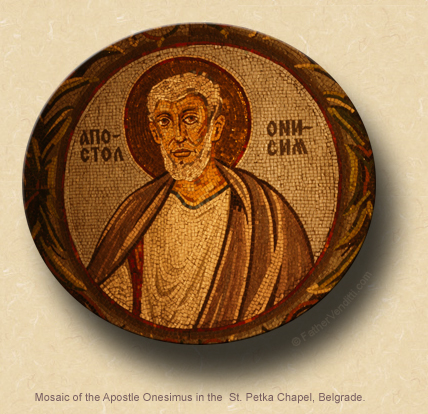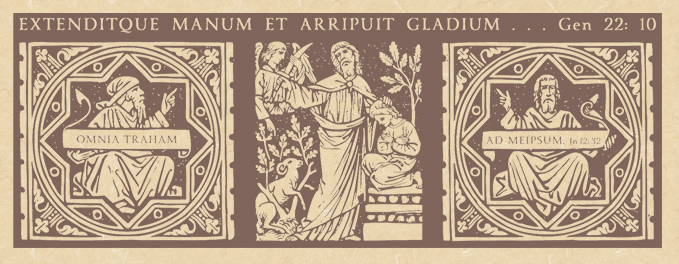Grace Is Not a Fairy Tale.
The Twenty-Third Sunday of Ordinary Time.
Lessons from the tertiary dominica, according to the ordinary form of the Roman Rite:
• Wisdom 9: 13-18.
• Psalm 90: 3-6, 12-17.
• Philemon 9-10, 12-17.
• Luke 14: 25-33.
The Thirteenth Sunday after Pentecost; and, the Commoration of the Nativity of the Blessed Virgin Mary.*
Lessons from the dominica, according to the extraordinary form of the Roman Rite:
• Galatians 3: 16-22.
• Psalm 73: 20, 19, 22.
• Luke 17: 11-19.
FatherVenditti.com
|
 8:49 AM 9/8/2019 — Some of the things said by our Lord in today’s Gospel lesson seem a bit extreme and make us uncomfortable. We love our families, and to be told by our Lord that without “hating [our] father and mother, wife and children, brothers and sisters, and even [our] own life, … [we] cannot be [His] disciples” (Luke 14: 26 NABRE), it rubs us the wrong way. He follows it up with His usual statement about the necessity of carrying the cross, which is both a prediction of His Passion as well as a statement of pure spiritual fact. We know on these occasions how our Lord is fond of speaking in hyperbole; His point is one of being clear about our priorities—or, as I’ve said many times in previous homilies, our one purpose for being on this earth is to work out our salvation; everything else is just window-dressing. 8:49 AM 9/8/2019 — Some of the things said by our Lord in today’s Gospel lesson seem a bit extreme and make us uncomfortable. We love our families, and to be told by our Lord that without “hating [our] father and mother, wife and children, brothers and sisters, and even [our] own life, … [we] cannot be [His] disciples” (Luke 14: 26 NABRE), it rubs us the wrong way. He follows it up with His usual statement about the necessity of carrying the cross, which is both a prediction of His Passion as well as a statement of pure spiritual fact. We know on these occasions how our Lord is fond of speaking in hyperbole; His point is one of being clear about our priorities—or, as I’ve said many times in previous homilies, our one purpose for being on this earth is to work out our salvation; everything else is just window-dressing.
Many years ago—more than I care to remember—when I was still a seminarian, I attended a debate sponsored by Saint Vincent College in New York between two very famous theologians: one was my own professor of moral theology at the time, the late Msgr. William Smith, and the man who had been his professor of moral theology when he was in the seminary, Father Charles Currin, a well known dissenter from Church teaching who, not long after this, had his authority to teach in the name of the Church taken away from him by Pope John Paul II. One of the things that Father Currin said in his presentation was that Catholic moral teaching needed to heed the voice of the faithful; he argued that the simple fact that most Catholics in this country simply choose to ignore the moral teachings of the Church—about abortion, about contraception, about homosexuality, about whatever, take your pick—proves that the teaching of the Church must be wrong.
At the end of the debate, the floor was opened for questions, and a young woman in the audience approached the microphone and asked Father Currin this question: “Father,” she said, “if what you say is true, and that the wide-spread disregard of people for Church teaching proves that the teaching is wrong, then please tell me: what is the role of the Cross in the life of the Christian, and what do you make of our Lord’s words, ‘Whoever does not carry his own cross and come after me cannot be my disciple’” (v. 27 NABRE)? Father Currin had no answer for her. What answer could there be?
Msgr. Knox's translation of our first lesson from Wisdom is so much clearer than the one we just heard:
What God’s purpose is, how should man discover, how should his mind master the secret of the divine will? So hesitating our human thoughts, so hazardous our conjectures! […] Hard enough to read the riddle of our life here, with laborious search ascertaining what lies so close to hand; and would we trace out heaven’s mysteries too? Thy purposes none may know, unless thou dost grant thy gift of wisdom, sending out from high heaven thy own holy spirit (Wisdom 9: 13-14, 16-17 Knox).
We like to say that, with regard to God's Providence, there is no such thing as a coincidence; and, if you ever needed an illustration of that fact, it could easily be found in today's second lesson, which is taken from the Blessed Apostle Paul's letter to Philemon; for, it's truly a remarkable confluence of events that's being described here. It is the shortest of all Paul's letters—only one small chapter—and the most heart-felt.
Philemon was a Colossian and a friend of the Apostle, and he had a slave named Onesimus, who was a runaway. Onesimus ran away from Philemon, but—and here's where coincidence and Providence collide—he's captured by the Romans and happens to be imprisoned in the very same cell where Paul is being held temporarily while on his way to Rome to face a charge of treason, where he is converted and baptized by the Apostle.  The two become great friends, and Paul has a mind to take Onesimus with him to Rome, but the Romans decide that their authority to prosecute the runaway slaves of Jews is sketchy at best, so they release him; and, Paul decides instead to send him back to Philemon as an assistant to his master in spreading the Gospel, and he's sending this letter along with him. The two become great friends, and Paul has a mind to take Onesimus with him to Rome, but the Romans decide that their authority to prosecute the runaway slaves of Jews is sketchy at best, so they release him; and, Paul decides instead to send him back to Philemon as an assistant to his master in spreading the Gospel, and he's sending this letter along with him.
It's interesting what he does here—and here's another example of how handicapped we are having to read the Scriptures in English when we should really be reading them in Greek—because Onesimus, which is the Latin pronunciation, is a slave name; in Greek it's pronounced Ὀνήσιμον, which is the Greek word for “useful,” so it's a very common and appropriate slave name. And the irony of the situation is not lost on Paul, who uses his new friend's name to make his point: he tells Philemon that he initially thought that Mr. Useful would be useful to him in Rome, but, given the circumstances, he now realizes that Mr. Useful will be even more useful to Philemon in his mission to preach the Gospel to the Colossians. He imposes on Philemon only one condition: that he cease treating Onesimus as a slave, and welcome him home as a brother and partner in the ministry. “Do not think of him any longer as a slave,” says the Apostle; “he is something more than a slave, a well loved brother, to me in a special way; much more, then, to thee, now that both nature and Christ make him thy own” (v. 16 Knox); and, he goes on to suggest that, if Philemon has any notion to regard Paul as a brother and partner in the ministry, he must now do the same for Onesimus, who has now become the brother of both of them in the Faith.
And in an almost lighthearted moment, the Apostle points out another “coincidence” of Divine Providence: he concedes that Onesimus wronged Philemon by running away, but points out that, had he not done so, he and Paul would never have met, depriving the Church of a very “useful” instrument in spreading the Gospel to a whole different class of people.
We tend to view the events of our lives in very black and white terms: this which happened to me is good; that which happened to me is bad. We seldom stop to reflect on what twists and turns the Lord is employing to bring us to some realization or resolution by means of some event or person He has injected into our lives. If we truly believe that it's Providence rather than coincidence that governs the journey of the Christian soul, then we shouldn't be surprised or closed to anything the Lord may throw our way.
It’s way too easy to see ourselves confronted by some obligation the Christian life may throw at us and declare that it’s too much to handle. That’s a denial of Grace: “…who can know your counsel, unless you give Wisdom and send your holy spirit from on high?” (Wis. 9: 17 NABRE). No one argues that the obligations of the Gospel cannot be met by means of our own efforts; but, Grace is not a fairy tale. There comes a time in the life of every Christian when he must decide whether he’s going to believe the things our Lord has said. “Whoever does not carry his own cross and come after me cannot be my disciple” (Luke 14: 27 NABRE).
The challenge of Christian living is not a burden from which we should flee; it’s a promise which we should embrace.

* The Nativity of Our Lady is also observed in the ordinary form on this day, but is displaced completely by the Sunday, there being no provision for making commemorations on Sundays in the ordinary form. In the extraordinary form, the commemoration is made by adding the Collect, Secret and Postcommunion from the feast to those of the Sunday, so that there are two of each.
|

